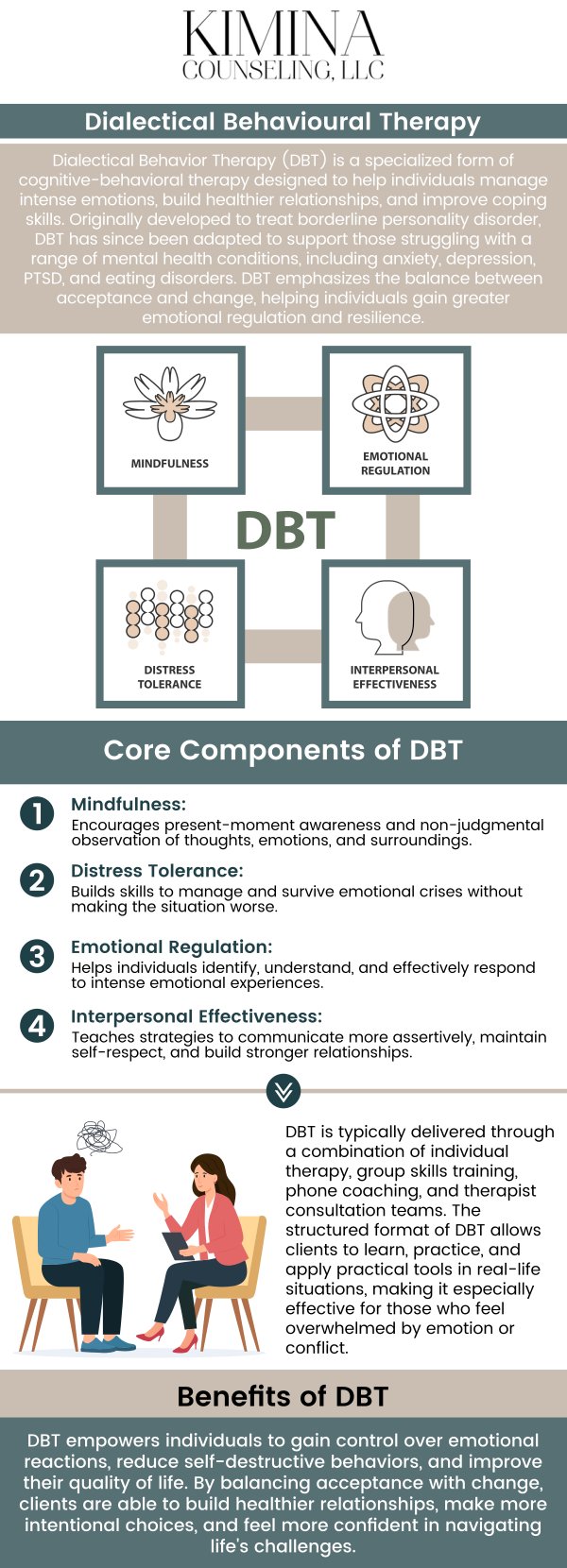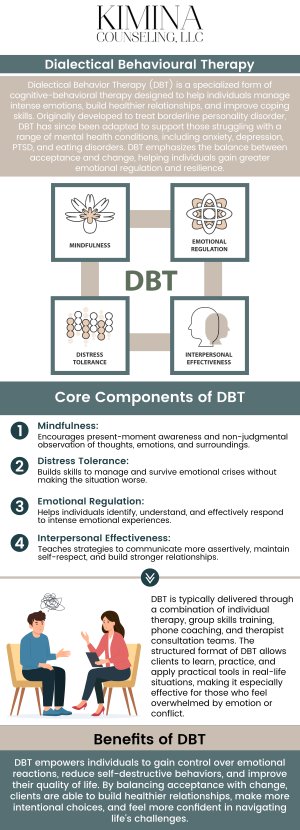Dialectical Behavior Therapy (DBT) in Auburn, MA
Dialectical Behavior Therapy (DBT) helps individuals manage intense emotions, improve relationships, and develop coping skills. It focuses on mindfulness, distress tolerance, emotion regulation, and interpersonal effectiveness. DBT helps reduce symptoms of anxiety, depression, and emotional instability. At Kimina Counseling, LLC, our team provides DBT to support your emotional healing and growth. For more information, contact us or schedule an appointment online. We are conveniently located at 7 Midstate Drive, Suite 202, Auburn, MA 01501.


Table of Contents:
What is Dialectical Behavior Therapy?
What issues can DBT help treat?
How long does DBT treatment typically last?
How does DBT help with managing anxiety and depression?
How often do I need to attend DBT sessions?
Dialectical Behavior Therapy (DBT) is a form of cognitive-behavioral therapy designed to help individuals manage intense emotions, improve interpersonal relationships, and develop healthier coping strategies. DBT was initially used to treat individuals with borderline personality disorder (BPD), but it has since been adapted for various mental health conditions, including depression, anxiety, and post-traumatic stress disorder (PTSD).
DBT focuses on teaching clients skills in four key areas: mindfulness, distress tolerance, emotion regulation, and interpersonal effectiveness. Mindfulness helps individuals become more aware of their thoughts and feelings in the present moment, allowing them to respond more thoughtfully rather than react impulsively. Distress tolerance skills focus on accepting difficult emotions without resorting to harmful behaviors. Emotion regulation teaches individuals to understand and manage intense emotions, while interpersonal effectiveness helps individuals communicate their needs and establish healthy boundaries.
DBT is often delivered in both individual therapy sessions and group skills training sessions. The therapy emphasizes the importance of validation, meaning acknowledging and accepting the client’s experiences while also encouraging change. DBT helps individuals build a balanced life, reducing emotional instability and self-destructive behaviors, and ultimately improving their overall quality of life.
Dialectical Behavior Therapy (DBT) is an effective treatment for a variety of mental health conditions, particularly those involving emotional regulation and interpersonal difficulties. It is most commonly used to treat borderline personality disorder (BPD), helping individuals manage extreme emotional reactions, impulsive behaviors, and interpersonal conflicts. DBT is also highly beneficial for people struggling with self-harm, suicidal ideation, and chronic feelings of emptiness, which are common in BPD.
In addition to BPD, DBT can be used to treat several other conditions, including depression, anxiety disorders, and post-traumatic stress disorder (PTSD). For individuals with depression, DBT helps in managing negative thought patterns and emotional dysregulation. People with anxiety can benefit from the distress tolerance and mindfulness techniques taught in DBT, helping them cope with overwhelming feelings and reduce avoidance behaviors.
DBT is also effective in treating eating disorders, particularly binge eating and bulimia, by addressing emotional eating patterns and promoting healthier coping mechanisms. It has been shown to help individuals with substance use disorders, as DBT helps them manage urges, avoid triggers, and improve decision-making skills. Additionally, DBT can assist in improving interpersonal relationships, enhancing communication, and building better social skills. Overall, DBT is a versatile therapy for treating conditions that involve emotional instability and difficulty managing relationships.
The length of Dialectical Behavior Therapy (DBT) treatment can vary depending on the individual’s specific needs, the severity of their condition, and their progress throughout therapy. Typically, DBT treatment lasts for about 6 months to a year, although it can be longer for individuals with more complex or long-standing issues, such as those with borderline personality disorder (BPD).
DBT is structured in stages, with each stage focusing on different aspects of treatment. The first phase of DBT generally focuses on stabilizing the individual, reducing self-destructive behaviors, and addressing crises. This phase often takes 3 to 6 months, depending on the individual’s response to treatment. During this phase, clients participate in both individual therapy sessions and weekly group skills training, which lasts for about 2 hours each session.
After the initial phase, the focus shifts to helping the individual improve emotional regulation, manage interpersonal relationships, and address underlying issues like trauma. This stage can take additional months, depending on the client’s progress. Some individuals may continue treatment for extended periods to maintain progress, work on deeper issues, or prevent relapse.
DBT is a long-term commitment that provides individuals with the tools to manage emotions and behaviors effectively. The therapist and client collaborate to determine the duration of treatment based on progress and goals.
Dialectical Behavior Therapy (DBT) is highly effective in helping individuals manage anxiety and depression by teaching them practical skills to regulate emotions, tolerate distress, and improve their relationships. One of the primary ways DBT addresses anxiety and depression is through mindfulness techniques, which encourage individuals to stay present in the moment rather than becoming overwhelmed by negative thoughts or fears. Mindfulness helps individuals observe their emotions without judgment, allowing them to respond to stressors more thoughtfully instead of reacting impulsively.
In addition, DBT provides distress tolerance skills, which are particularly useful when individuals are experiencing anxiety or depression. These skills enable individuals to cope with intense emotions without resorting to unhealthy behaviors, such as avoidance or self-harm. By learning how to tolerate distress and manage difficult emotions, individuals can reduce the cycle of anxiety and depression that often arises from trying to escape painful feelings.
DBT also helps with emotion regulation, teaching individuals how to identify, understand, and manage their emotions. This is especially beneficial for individuals with depression and anxiety, as these conditions often involve intense, overwhelming emotions. Finally, DBT’s interpersonal effectiveness skills improve communication and relationship-building, which can enhance social support and reduce isolation, further alleviating symptoms of anxiety and depression.
The frequency of Dialectical Behavior Therapy (DBT) sessions typically depends on the individual’s needs, goals, and the specific treatment plan developed by the therapist. In the initial stages of treatment, DBT often involves weekly individual therapy sessions, which generally last between 45 to 60 minutes. These sessions focus on addressing personal concerns, processing emotions, and applying DBT skills to real-life situations. Weekly sessions provide a consistent structure for learning and reinforcing coping mechanisms while allowing the therapist to assess progress and make any necessary adjustments to the treatment plan.
In addition to individual therapy, DBT includes weekly group skills training sessions, typically lasting 2 hours. These group sessions teach core DBT skills such as mindfulness, distress tolerance, emotion regulation, and interpersonal effectiveness. Attending both individual therapy and group sessions provides a comprehensive approach, helping individuals practice the skills they learn in therapy and gain support from others who are also working on similar issues.
As treatment progresses and clients begin to make significant improvements, the frequency of sessions may decrease. However, this depends on the individual’s progress and the therapist’s recommendations. Some individuals may continue with weekly sessions for a longer period, while others may switch to bi-weekly sessions or even monthly check-ins once they feel more confident in managing their emotions and behaviors independently.
We encourage open communication about your therapy goals and needs, so that together we can facilitate your journey toward emotional wellness and personal growth. For more information, contact us or schedule an appointment online. We are conveniently located at 7 Midstate Drive, Suite 202, Auburn, MA 01501. We serve patients from Auburn MA, North Oxford MA, Worcester MA, Grafton MA, South Worcester MA, Newton Square MA, and surrounding areas.

Check Out Our 5 Star Reviews


Additional Services You May Need
▸ Individual Therapy
▸ Couples Conseling
▸ Family Counseling
▸ EMDR Therapy
▸ Anxiety
▸ Depression
▸ Trauma
▸ Post-traumatic stress disorder (PTSD)
▸ Bipolar Disorder
▸ Serious Mental Illness (SMI)
▸ Parenting and Post-Partum
▸ LGBTQ+
▸ Phobias
▸ Grief
▸ Attachment Disorders
▸ Personality Disorders
▸ Obsessive Compulsive Disorder
▸ Substance Use Disorders
▸ Family Conflict
▸ Attention Deficit (ADHD)
▸ Behavioral Therapy
▸ Anger Management

Additional Services You May Need
▸ Individual Therapy
▸ Couples Conseling
▸ Family Counseling
▸ EMDR Therapy
▸ Anxiety
▸ Depression
▸ Trauma
▸ Post-traumatic stress disorder (PTSD)
▸ Bipolar Disorder
▸ Serious Mental Illness (SMI)
▸ Parenting and Post-Partum
▸ LGBTQ+
▸ Phobias
▸ Grief
▸ Attachment Disorders
▸ Personality Disorders
▸ Obsessive Compulsive Disorder
▸ Substance Use Disorders
▸ Family Conflict
▸ Attention Deficit (ADHD)
▸ Behavioral Therapy
▸ Anger Management






